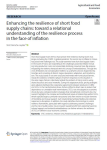Deroche-Leydier Y. (2025). Enhancing the resilience of short food supply chains: toward a relational understanding of the resilience process in the face of inflation. Agricultural and Food Economics, 01/12/2025, vol. 13, p. 31.
https://doi.org/10.1186/s40100-025-00368-4
https://doi.org/10.1186/s40100-025-00368-4
| Titre : | Enhancing the resilience of short food supply chains: toward a relational understanding of the resilience process in the face of inflation (2025) |
| Auteurs : | Y. Deroche-Leydier |
| Type de document : | Article |
| Dans : | Agricultural and Food Economics (vol. 13, December 2025) |
| Article en page(s) : | p. 31 |
| Langues : | Anglais |
| Langues du résumé : | Anglais |
| Catégories : |
Catégories principales 08 - ALIMENTATION ; 8.3 - Politique et Sécurité AlimentaireThésaurus IAMM SECURITE ALIMENTAIRE ; CIRCUIT COURT ; CIRCUIT DE DISTRIBUTION ALTERNATIF ; CHAINE D'APPROVISIONNEMENT ; RESILIENCE ; DURABILITE |
| Résumé : | Short food supply chains (SFSCs) have proven their resilience during recent challenges, including the COVID-19 global pandemic. The recent rise in inflation in France has posed new challenges too. This study examines how short food supply chains in the South of France are responding to the challenges posed by inflation including rising production costs and a potentially shrinking consumer base. We propose integrating the resilience literature with the concept of embeddedness. Through this cross-fertilization, we conceptualize resilience as a dynamic process shaped by relationships and consisting of distinct stages: absorption, adaptation, and transformation. The study, based on 30 semi-structured interviews with horticultural farmers, reveals the existence of distinct phases in farmers' responses to the situation. In the early stages, farmers collectively tackled the problem of rising costs by using shared resources and social networks. During the adaptation phase, pricing strategies were adjusted, facilitated by cooperative agreements between producers in different SFSCs. In the transformation phase, farmers shifted to direct sales to reduce their dependence on unreliable retail intermediaries. SFSCs not only adapted to economic shocks but also cultivated resilient strategies that strengthened community ties. Our research highlights the complex and multifaceted nature of relationships within SFSCs, which typically begin as primarily transactional and often evolve to include elements of friendship and mutual support. Such relationships facilitate flexible and collective responses to disruptions. In addition, the study identifies shortcomings in current resilience frameworks, particularly with regard to addressing systemic challenges and the role of public policy. Future research would benefit from exploring how institutional support and territorial embeddedness can further enhance the resilience of SFSCs in different socio-economic contexts. |
| Cote : | En ligne |
| URL / DOI : | https://doi.org/10.1186/s40100-025-00368-4 |







